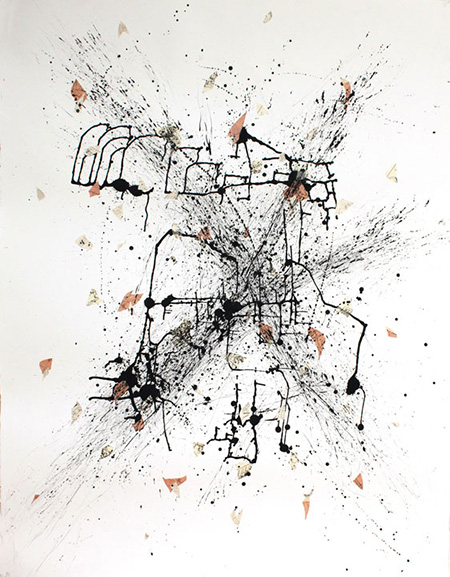
Continuing through October 31, 2017
The 19th century neoclassicist painter J.A.D. Ingres famously said that drawing — this during the era when painters drew from plaster casts of Greco-Roman statuary — was “the probity of art,” i.e., the source and origin of good, rational design. In the 21st century Peter Foucault combines drawing made by small robots with supplementary/complementary handwork that are in synch with the digital age. The process is all about going beyond one’s taste, predilections and facility to express the needs of the present with the latest available tools. "Drawing in Dystopia" includes eight abstract drawings on paper, wood panel and alupoly (a polyethylene foam core faced with aluminum sheets, typically used for signage) that exploit chance and deliberation in order to comment on our cultural and political moment, with human institutions and natural systems veering out of control, or on the verge of it, in what seems a devolution into chaos and entropy. Foucault employs technology to question technology (albeit in the service of irrational, short-sighted goals).
The social critique underlying the work is not, however, overt. The works are beautifully executed calligraphic abstractions. Some include collaged excerpts from US Geological Survey maps. Stylistically, these would not look out of place in an Abstract Expressionist or even Surrealist show. The visionary drawings of Henri Michaux and Wols, and the paintings of Klee, Miro and Gordon Onslow-Ford are relevant antecedents. “Subdivision 1, “ with its blown-ink orthogonals are counterpointed by diagonal blown-ink sprays. “Confluence 2” adds collaged bits of topographical maps, suggesting astronomic vistas punctuated by wormhole views. “Doomsday Machine,” with its reference to nutter apocalypses, is equally absorbing. Also noteworthy are two drawings on wooden panel, with the loosely woven grid set down by the robot — there really ought to be photos of this collaborator — repainted in ink by hand, in what must have been a meditative frame of mind, like a medieval copyist for our dark ages.
